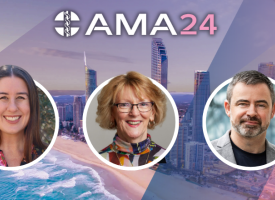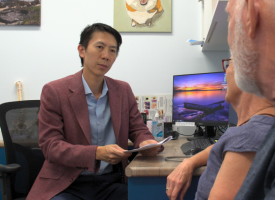Patients need access, not more confusion
The newly introduced nurse-led walk-in clinics make little sense, are expensive for taxpayers and will only further confuse patients, AMA Queensland Immediate Past President Dr Maria Boulton told 4BC Radio. "Given that Queensland is such a decentralised state and it's impossible for the government to fund these clinics everywhere... why not fund the clinics that are already there? They're called general practice clinics."

Transcript: AMA Queensland Immediate Past President, Dr Maria Boulton, 4BC Radio, Afternoons with Michelle Tapper, Wednesday 3 July 2024
Subject: Nurse-led walk-in centres and respiratory illnesses
MICHELLE TAPPER: Unfortunately, Dr Gino Pecoraro has been caught up in a medical emergency of some sort. So, joining us today, we'll have Dr Maria Boulton. She's the Past President of AMA Queensland. Maria, so good to have you on the phone. Thanks for filling in for Gino. Hi, Maria. How are you?
DR MARIA BOULTON: Hi, Michelle, really well, and it's always a pleasure to fill in for Associate Professor Pecoraro. Always.
MICHELLE TAPPER: I know, we miss having him on the show. I hope everything's okay, but glad you're available. Now look, AMA Queensland has slammed Queensland's new walk-in clinics, saying they just add to the confusing healthcare options, they make no sense and they'll do little to ease pressure on emergency departments. What's your take on all of this?
DR MARIA BOULTON: Well, it's completely true, and the other thing is that they cost a lot of money to produce health outcomes that aren't what we need. So for every dollar that is spent in those clinics, those dollars could be spent with your general practice clinic and ensure that every Queenslander has access to healthcare, not just people who live close to urgent care centres or these nurse practitioner led clinics, which I understand the first one will open up in the CBD which is already serviced by many GP clinics. We know from studies that people who see their GP regularly are healthier and they're less likely to end up in hospital, but for some reason, funding very rarely gets to patients to access their GP. I don't know why when it makes perfect sense to fund that instead.
MICHELLE TAPPER: So, these nurse-only walk-in clinics, they have been proven to be inefficient in other jurisdictions. Why are they happening? Why have they just decided to roll this out right now?
DR MARIA BOULTON: I'm not sure, especially given that we know that the nurse practitioner led clinics that have opened up in the ACT have not led to reductions in emergency presentations, and they're actually quite expensive. So, it costs the taxpayer about $200 per consultation versus a GP consultation which is about $41 to $42. So not only are they expensive, but often people end up being referred elsewhere because they can't provide the care that they need.
It also confuses people and that's what's happening in Queensland. It's just another confusing place. Like where do people go? Do they go to a satellite hospital? Do they go to an urgent care clinic? Do they go to the emergency department? It just adds to the confusion, and given that Queensland is such a decentralised state and it's really impossible for the government to go and fund these clinics everywhere, instead, why not fund the clinics that are already there? They're called general practice clinics, they're already open in most communities. What people do need is improved access, particularly after hours. That would improve if the funding for people to access those services after-hours was increased.
MICHELLE TAPPER: You're absolutely right there about after-hours. Anyone with children knows that all the accidents happen late at night or on the weekend, and you just can't find a clinic that will take them. But look, I just want to clarify because I'm confused, so I'm thinking probably some of our listeners might be confused. So, Queensland now has urgent care clinics, satellite hospitals and new nurse-only walk-in clinics. Can we just break it down? So, what is the difference between them? I've been out to a satellite hospital, and they look pretty similar to hospitals – obviously much more streamlined, a whole lot smaller – but satellite hospitals don't do surgery. What's the other difference there?
DR MARIA BOULTON: They don't have the full complement of emergency services that an emergency department has, and they also can't admit people overnight.
MICHELLE TAPPER: Right? Okay, so that's a key point.
DR MARIA BOULTON: That is a key point, you can't stay. So if you're suffering, for example, from chest pain or signs of a stroke, you're better off going to an actual emergency department or ringing 000 if it's an emergency. It's that word, hospital, that confuses people, and every satellite hospital offers different services. So, some will offer dialysis, which is welcome in those communities, but some won't. Some will offer some outpatient mental health services, for example. So, there is a website where people can go and look at each particular satellite hospital, which is what I've done in the past. But it's not a hospital as people understand a hospital to be, which offers all those services that a satellite hospital won't.
MICHELLE TAPPER: The problem is, when you have a medical emergency, who has time to sit down and start googling? Does my local satellite hospital, you know, will it put a cast on my kid's arm, or do I have to drive all the way into the city and battle with the crowds at the children's hospital? It's just too confusing.
DR MARIA BOULTON: It is very confusing. I've been a GP for 20 years, I've lived in Brisbane and also in Mackay, and I used to always tell all my patients who became new parents, if you ever have an emergency and your baby is currently this age and it's after-hours then this is the place you need to go. I also just make sure that they know how to get there, because the last thing you want is to have a kid who has, for example, respiratory distress, and perhaps not know where to go or not know who to call. In an emergency, call Triple Zero, but if you need an emergency department, then it's working out which emergency department actually also looks after children because not all of them do as well.
So sometimes if you're worried or if you have, for example, any chronic illnesses that can turn acute or any dependents or children that you're worried about, it might be worthwhile having a chat to your GP about what your options are in case. Hopefully it won't happen, but in case you do need that urgent care.
MICHELLE TAPPER: I think that's great advice, have an action plan. I'm going to take that on board. But you know, having been to every medical centre and hospital around Southeast Queensland, we do have an action plan. But you know what, we were just caught out actually on Friday.
So, it was my husband's birthday, he was out kayaking off the coast in Byron Bay, had a big accident – kayak flipped up, whacked him in the head. He was with my daughter, I luckily happened to be on the beach and he comes out of the water, blood streaming down all over his face, it looked like a really bad Halloween costume situation. My daughter's screaming, I didn't have a phone with me, I had to get someone to rush us back to the accommodation. Then I'm like – oh, how about we just go to the clinic? There's a doctor’s clinic just down the road. It was about 3:30 on Friday afternoon, we go in there and the doctor goes – oh no, I can't irrigate that wound and I can't do stitches here. We were like – what do you mean, because our local medical centre here in Brisbane does do stitches, has a little surgery room? So, she's like – oh, you'll have to go to the hospital. So, we did go to Byron Bay hospital and we actually had great service. He was in and out within about an hour and got stitched up. But that surprised me that your local doctor's clinic couldn't do stitches or glue.
DR MARIA BOULTON: Yes, it does vary from clinic to clinic. Honestly, I have children and whenever they have ended up in hospital, it always happens during holidays. We're away somewhere where I just don't know the system or where to go, and it puts you in that same position. It can be quite tricky to the point where whenever I go on holidays with our friends, I take some suturing equipment just in case, because you never know. But it's always when I travel with my own children, and, you know, you do need that level of objectivity, and you do need your own doctor to look after your family members. But it's difficult to know where to go, but at least you went somewhere where somebody said to you – well, this is where you need to be.
MICHELLE TAPPER: Yes, they gave us a plan, yes.
DR MARIA BOULTON: They could have called Triple Zero for you.
MICHELLE TAPPER: Well, he didn't need Triple Zero but, you know, obviously I won't be carrying my suture kit, but maybe I'll take some superglue next time, just in case. But look, nurse-only walk in clinics, that boggles my mind. What is that going to be? Can they only give sort of Nurofen, or I mean, what are they going to do? It sounds like something that you'd have at a school.
DR MARIA BOULTON: They're quite limited as to their scope of practice. They are able to prescribe some medications, they are able to do dressings, for example, but obviously they won't be able to do everything that your GP or the emergency physician can do. It's a real shame because I'm a GP and I work in a multidisciplinary clinic where we have four wonderful nurses, and we know that the money that is going towards opening this nurse practitioner clinics could have funded one full-time nurse for three years in 10 per cent of general practices. I think it was just a missed opportunity to have more nurses go into general practice to help look after patients together with everybody else that's there – GPs and sometimes we have psychologists and physios and I think it's just a missed opportunity and the money could have been better spent.
MICHELLE TAPPER: I completely agree with you. Speaking to Dr Maria Boulton, she is the Past President of AMA Queensland, she's also a GP here in Brisbane. I've got a text message from a listener; Jason in Pimpama says – I have a mild chest infection but have not been to the doctor because I hope and I think it'll clear up on its own. But are there long-term complications that might come with leaving something like this untreated?
DR MARIA BOULTON: Thank you for the question. At the moment it’s something we’re hearing a lot of because everybody seems to have respiratory symptoms. We know that there’s a lot of viruses going around. So, there’s RSV, there’s rhinovirus, there’s COVID, there’s influenza. But there is also a couple of bacterial infections going around. So, one is mycoplasma and the other one is whooping cough. I know that they can both be quite nasty especially if you’re at high risk of severe disease. Both of those conditions, you do benefit from having antibiotics. It’s really tricky even as a doctor sometimes to say whether a patient has a virus or a bacteria and that’s where the testing swabs come in and then we know that we’re treating the right thing. So, what I would suggest is that if you’re unsure or especially if you’re getting worse, that you do visit a doctor and get examined because it’s really important to have a listen to your chest and see what’s happening. It’s also important to see how hard you’re working with your breathing and certainly if it’s an emergency, get urgent care. But I wish you all the best and certainly if you’re unsure, as I always tell all my patients, go get checked. It’s really important because sometimes we hear from people who perhaps think that they’re very mild in their illness but end up having more severe illness than what they thought.
MICHELLE TAPPER: Okay and just one quick question from Peter in Brendale. I like this question because it relates to me. Are there preventative measures I can take to reduce my risk of developing arthritis?
DR MARIA BOULTON: There’s different types of arthritis. So, there’s your wear and tear or osteoarthritis, and then there’s your inflammatory arthritis. The inflammatory arthritis tends to have a huge genetic component, so there are people who end up with, for example, rheumatoid arthritis or psoriatic arthritis. Sadly you can’t change your genes. But when it comes to the osteoarthritis or the wear and tear, the advice is that you keep to a healthy weight because if you do carry excess weight, that puts a lot more load on your knees and on your hips. Also, that you keep healthy and active. So, make sure that you exercise, make sure that your weight is healthy and the worst thing that we can do is, I know at the moment, we all work in front of our computer.
MICHELLE TAPPER: Get up and move around, yes. What do they say, sitting down is the new smoking? Look, Dr Maria Boulton, thank you so much for joining us. Really appreciate your time today. Dr Maria Boulton, the Past President of AMA Queensland. It’s time for a break.



